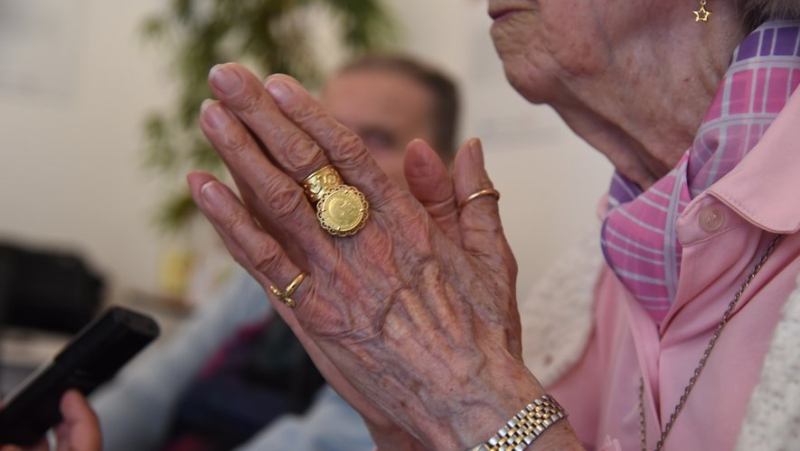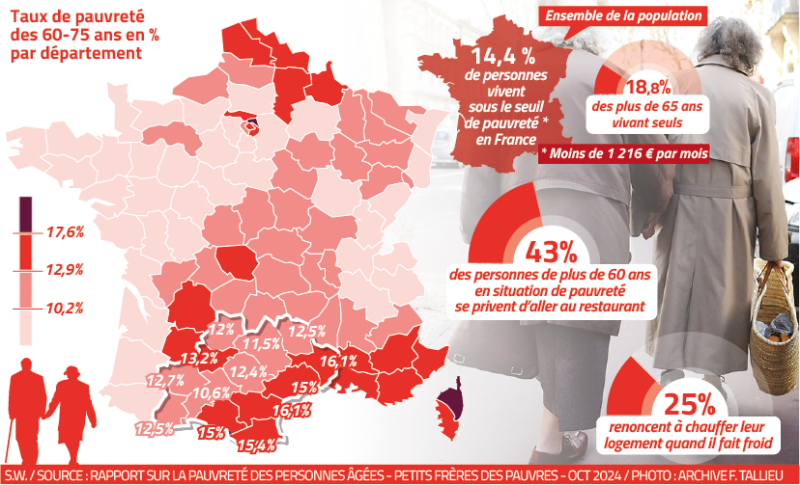Deprivation, isolation… Occitania illustrates the alarming report of the Little Brothers of the Poor on poverty among the elderly

Les personnes âgées les plus isolées sont souvent des femmes, l’un des enseignements du rapport des Petits Frères des Pauvres. Midi Libre – RICHARD DE HULLESSEN
“Les Petits Frères des Pauvres” révèle le difficile quotidien de personnes âgées vivant sous le seuil de pauvreté. L’Occitanie n‘est pas épargnée.
Martha is 66 years old. The age when you can fully enjoy retirement. Life. Travel, go to the theater or a restaurant, spoil your grandchildren… But it's impossible for her.
This resident of the Occitanie region receives “700 euros in retirement". With various allowances, she barely exceeds 1,000 euros. "It relieved me when I had help from the Little Brothers of the Poor, it helps me forget my worries for a few hours", she sighs. Martha is one of those faces of poverty among the elderly that the association highlighted in its latest annual report. A dense work that reveals that more than 2 million people in France live their third age "below the monetary poverty line".
This was set at 60% of the median standard of living, or 1,216 euros per month for a single person and 1,824 euros for a couple. According to INSEE, this poverty affected 10.6% of 65-74 year-olds in 2022 compared to 7.5% in 2017. “Our society is no longer able to contain and even less to resolve the poverty of the least privileged seniors, while they are already facing an aging that is sometimes denigrated and, for some, the inadequacy of their inhabitants and the loss of autonomy and it offers those who are already in a situation of poverty very bleak prospects”,warns the general delegate of the Little Brothers of the Poor, Yann Lasnier. This is particularly true in Occitanie, where the average poverty rate for those aged 60 and over is among the highest in the country, at 13.8%, and especially in Gard, Aude, Hérault and Pyrénées-Orientales.

The poverty of the elderly is particularly marked in Occitanie. S.W.
“I can't eat three meals a day”
The observation is “alarming”, says the association which, beyond the figures, wanted to humanize its survey by questioning its beneficiaries on the consequences of this precariousness. And the conclusions are harsh, like Martha's testimony. “I can't make three meals a day. It's too expensive and it's a budget. I have to juggle, because if my pension has increased by 10 euros, everything else has increased by much more and when I've paid all the bills, I don't have much left. The only thing I can cut back on is food and gas. So, to eat, I only take things that I have to reheat, not cook because the gas consumes too much. What I do, I buy frozen stir-fries for the evening and coffee with milk during the day, and I keep like that", says the sixty-year-old. She also says that while it is difficult for her to pay for everyday costs, the sudden breakdown of an appliance or her car is too hard to take. “For my fridge, I had to take out a micro-loan. It is a small monthly payment, but I have enough for another five years”. In this case, she must forget “the little pleasure” that she offers herself when she can: “a little dress for example”.
The association in the region
In 2022, Les Petits Frères des Pauvres en Occitanie supported or welcomed 1,638 people over the age of 50. The association has 38 branches in the region and 1,432 regular volunteers. They organize local actions to combat the isolation, loneliness, poverty or exclusion of beneficiaries. However, the annual report shows that there could be more of them.
Social link – unable to afford a restaurant –, heating, food, health… Like Martha, 69% of poor elderly people have experienced deprivation in the last twelve months. One in ten people also say they do not have supplementary health insurance, a proportion that doubles among those who earn less than 750 euros per month. Martha thus gave up on treatment for a long time to ease knee pain, "I told myself that I was walking and that was the main thing",until the association takes care of 75 euros each month "for an injection".
The report shows that it is women, who live longer than men, and therefore in solitude, and who have often put their careers on hold to look after children or follow their husbands on a professional transfer, who are more exposed. Another lesson from the study: without computer equipment or in the absence of digital ease, 73% of poor elderly people have difficulty with the dematerialization of procedures. “More than one in two people do not receive any help and feel poorly informed”, adds the association. This is particularly the case for aid to adapt one's housing to aging.
Improving purchasing power and zest for life
The Little Brothers of the Poor therefore accompany their report with a series of twenty recommendations, first to increase purchasing power “with the immediate revaluation of the minimum old-age pension to the poverty threshold”, but also to strengthen access to rights “by creating the conditions to make solidarity effective at source by expanding eligible benefits, including the minimum old-age pension, in order to reduce the high rate of non-take-up”. The experiment launched on October 1 in five departments, including Hérault, currently only concerns the RSA and the activity bonus.
The association also asks the executive to work on “giving people a taste for the last quarter of life”, by introducing an activity pass subject to resource conditions, by making public transport free for those over 65 to combat geographical isolation or by promoting the “seniors on holiday” program. Martha, since she has been supported by Les Petits Frères des Pauvres, testifies that maintaining connections is also a source of wealth. “Now I am surrounded, I want to go out, move, clear my head. It changes everything!"
A conference is being held this Tuesday, October 1st in the conference room, Saint Charles I, Maison des sciences de l’homme, 71 rue Professeur Henri de Serre. From 1:45 p.m. to 4:30 p.m., in Montpellier. Registration on petitsfreresdespauvres.fr.
The conference hosted by Laurence Birelichie, regional director of Petits Frères des Pauvres Occitanie, will be structured around the presentation of the report with a regional focus followed by a conference debate with the speakers and an exchange with the audience.
Direction of Petits frères des pauvres Occitanie: “Heating and outings excluded!”
Célina Sampedro, you are the deputy director in Occitanie. What is your mission?
We currently support 1,600 people, aged 50 and over, who are in precarious situations. The core of the association is to combat isolation and to connect with our volunteers, in one of the 13 regional fraternities. Around twenty employees support the forty or so teams of volunteers in the field, i.e. 1,500 people.
What did you notice when reading this report?? What lessons did you learn from it??
The poverty line is set at 1,200 euros, while the minimum old-age pension is around 1,000 euros per month. We should already be thinking at the political level about filling these 200 euros. There is something there that is not logical. With a national sample of 755 individuals aged 60 and over, living below the poverty line in France, we have managed to produce reliable regional trends. On the one hand, on social ties and deprivations, – food or heating for example – and on the other hand, on aid and access to rights. Furthermore, ageing is increasing. The 60-74 age group was 15.5% in 2010, today it is 18.5%.
What are the most significant deprivations?
Heating, with +7% compared to the national average and cultural outings, with +4% are excluded from daily life. Generally speaking, 43% of the elderly in the region have difficulty paying their bills.
Occitanie is therefore one of the most affected regions in France. Why ?
Indeed, there is a high proportion of elderly people living in poverty. The territory is very large, diverse and in places very rural. With 18.5% of 60 to 74 year olds living on less than 1,200 euros per month, when it is 10% at the national level. For 75 year olds it is at 11%. The Pyrénées Orientales and Aude are very affected, as well as rural areas. And yet, we don't even go as far as Lozère.
Are single women more victims??
Women who have had precarious employment all their lives do not always benefit from a minimum pension, and only live on their husband's survivor's pension.
Do all these people know about the assistance they are entitled to??
51% of them do not receive assistance, but the awareness rate is higher than the national average, with +12 points for the energy check, +10 points for APL. And in the region, 39% feel more comfortable with digital technology, compared to 27% in the country.
I subscribe to read the rest




